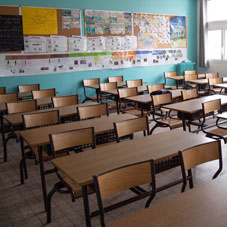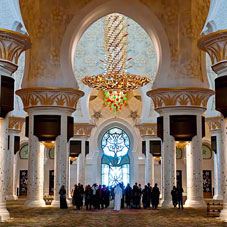
US Department of State Report: Freedom of Religion in Georgia
By Anastasia Sokhadze
Friday, June 12
The U.S. Department of State’s annual report examines the situation in terms of freedom of religion in all countries. The document includes government policies in the field of religion, the state of religious groups, and the US policy to promote religious freedom in the world.
16 pages of the report is dedicated to Georgia. In the section The Status of Respect for Religious Freedom by the Government, special attention is paid to the privileged role enjoyed by the Georgian Orthodox Church in the country. The report emphasises that on the basis of a constitutional agreement, the Concordat has granted SME rights that are not available for other religious groups.
These include the legal immunity of the SME Patriarch, the dismissal of SME clergymen from military service (although, as the authors of the report note, clerics of all religious groups are legally exempt from compulsory military service), and the SME government has an advisory role, especially in education.
The report also reviews the economic benefits of SME. For example, unlike other religious groups, only the SME Patriarchate is exempt from tax on profits from the sale of crosses, candles, icons, books, and calendars. Only SMEs can purchase non-agricultural land directly from the state, while religious groups must participate in a public tender to purchase such land. Only SMEs have the right to receive agricultural land free of charge from state property. Other religious groups have to pay for it.
The report also discussed the issues of religion in prison. According to the State Department's report, prisoners were allowed to use the chapels of the Georgian Orthodox Church during the reporting period, but there was no room for other religious practices in penitentiary institutions.
Special significance is drawn to the case of Vitaly Safarov. The sub-chapter, which examines the attitude of the authorities towards religious issues, has a prominent place in the notorious criminal crime of 2018 - the murder of Vitaly Safarov, a 25-year-old human rights activist. The report draws attention to the court's finding that Safarov, who was of Jewish and Yazidi descent, was not killed on the grounds of “racial, religious, national or ethnic intolerance.” It also said that human rights activists thought that Safarov's killers belonged to neo-Nazi groups and were carriers of ultranationalist ideas.
“The parliament has discussed several times last year a law that puts the Georgian Orthodox Church in a superior position over other religious groups and gives them privileges in matters of taxation and private property. In 2018, the Constitutional Court ruled that the SMEs subject privileges were unconstitutional and demanded legislative changes that would either abolish these privileges or grant them to all other religious groups,” the report stated.
General courses on religion give preference to Orthodox theology, praying in the classrooms in an Orthodox manner. The document also states that icons and religious symbols are publicly displayed in schools, even though the law prohibits proselytism.
The Georgian Orthodox Church does not offer official religious lessons to students in public institutions. Nevertheless, the report reads that during the year in question, SME clergymen visited public schools during school hours, which is allowed by law only in the after school hours. This was often done at the initiative of individual teachers or the school administration. The meeting of the Orthodox clergyman with the teachers, in which he spoke mainly about the importance of Christianity in Adjara, which is predominantly Muslim, is mentioned for the sake of visibility. After the meeting, the principal of one of the high schools said that it was the duty of education specialists to ‘return the students to their old faith.’ The human rights activists' complaint regarding this issue went unanswered.
The 2018 report of the Council of Europe on the Status of Respect for Religious Freedom by the Community states that after LGBT people in Georgia, Jehovah’s Witnesses are the group most likely to be discriminated against.
The report concludes with the Public Defender’s Office’s Tolerance Center that the belief that religious minorities are a threat to the Georgian Orthodox Church and the country's cultural values is widespread in the country. The report of the Council of Europe for 2018 states that 36% of citizens think that diversity has a negative impact on the country and harms its culture and traditions.
The report examines statements of religious intolerance made on television, the Internet, and the print media. Their number has decreased compared to the previous year (148), in 2019 there are 55 such incidents. The words of Archpriest Davit Isakadze that Catholicism is the greatest deviation from Christian dogmas and heresy are especially noteworthy.
In a 2019 report by the State Department, a separate section is devoted to violations by ‘foreign and non-state actors.’
Jehovah’s Witnesses continue to be persecuted in occupied South Ossetia and Abkhazia. However, in some cases they are able to rent buildings for religious gatherings.
“Representatives of the Georgian Orthodox Church have not been able to travel or worship in Abkhazia, which has been occupied by Russia, including in the Gali district, which is populated mainly by ethnic Georgians. According to the State Agency for Religious Affairs, ethnic Georgians in the district were forced to move to areas controlled by Tbilisi to celebrate religious holidays,” the report states. Amnesty International stated in July 2019 that Jehova’s Witnesses in and around occupied South Ossetia could not walk in churches near the administrative border with the rest of Georgia from fear of being captured by Russian troops.
The document also cites Freedom House's February 2019 report that South Ossetian de-facto authorities are increasingly forcing Orthodox churches in its territory to join the Russian Orthodox Church.
According to the report, non-Orthodox religious organizations continued to face opposition from the government as they tried to obtain building permits for buildings intended for worship. Among the specific cases, special attention is paid to the construction of a mosque in Batumi. The report cites the position of members of the Muslim community that there is not enough transparency with regard to the government policy on the construction of mosques.


